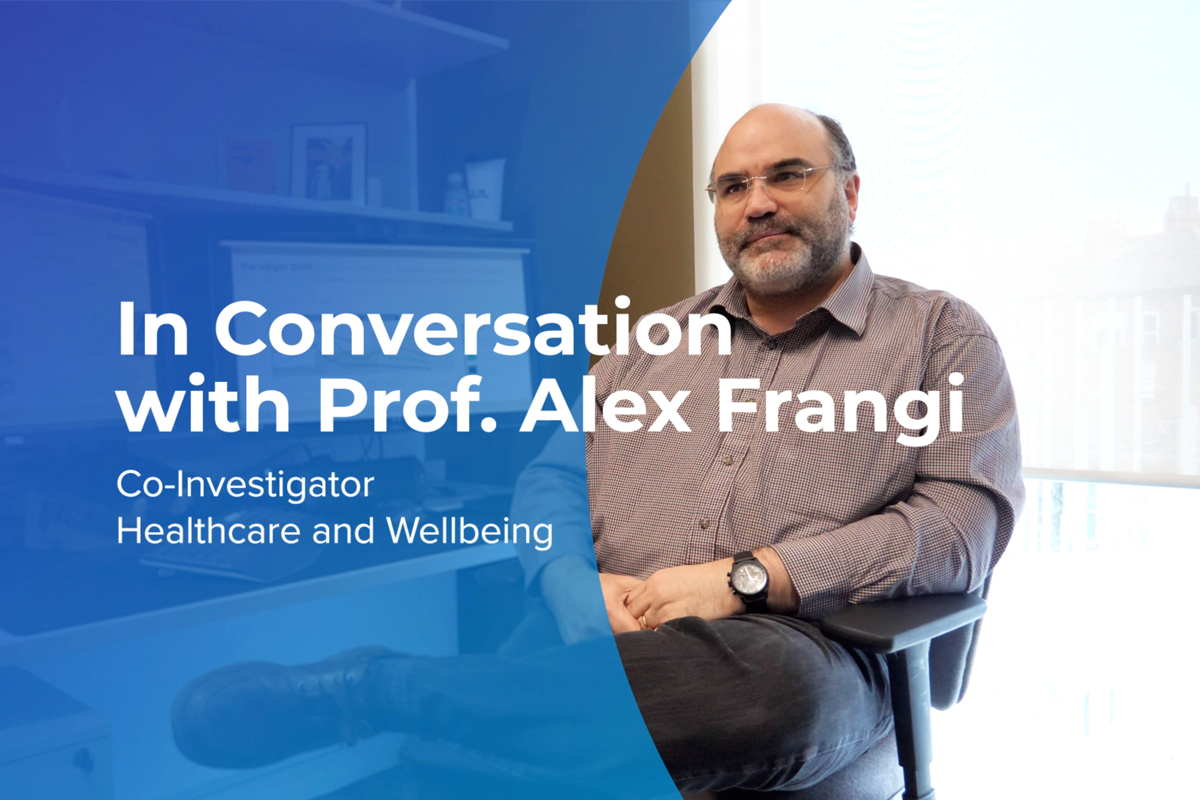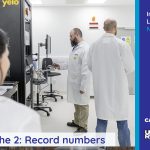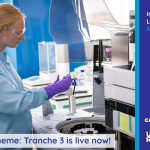Long Read: In Conversation with Professor Alejandro Frangi

Our Investigator for Healthcare and Wellbeing and Leeds University’s Professor Alejandro Frangi discusses the Innovation Launchpad Network+, In Silico trials and how researchers can take advantage of our funding opportunities.
Hi Alex, who are you and what is your role within our Network?
I’m one of the two leads for the Health and Wellbeing theme and what we are trying to do in this theme is to elicit from the community across the UK the ideas that come from academia for any type of technology that relates to any one of the Catapults that we are collaborating with, but that they are at this stage where the technology has been already developed to some degree. They are usually in technology readiness levels, say between one and five, and what the collaboration with this Network will do is help them to try pulling it to the next stage. And the next stage could be either that they already have a very clear idea about what is the route to market or the route to a particular sector that they’re interested in, but they simply don’t have the capability to do the prototyping or to do aspects that will facilitate future commercialisation or the other way around. They do have a technology that they are looking for possible domains where it can be, when it can be applied, and the interaction with the Network or the scheme will help them to sort of talk to the various Catapults and identify opportunities to benefit industry.
We take the view that in the UK there is a huge amount of great research that is going on in various universities across the country. And colleagues like myself don’t necessarily have experience in what it takes to translate it to industry or they don’t even know which industry could utilise in them. And what we look at is how we can help them to take their research to the next level. But at the same time, there is also a huge amount of industry that is requiring solutions to really very difficult problems in areas where the UK, you know, is pioneering or is a frontline of the research. But the problem with industry, and I also have talked to a lot of colleagues in our area here in the Leeds City Region, they don’t know how to have access to that skill set, and that’s an area where I think the Catapults could help by providing them that link, that nexus of connectivity with with academia through or through a network.
The full interview with Professor Alejandro Frangi is available to watch below
So how did you come to have this role at the Network?
So the Leeds City Region is actually quite well-known for its base of industry, particularly in the health tech and in the digital health space. And this is something that I work at West Yorkshire Combined Authority, the Leeds Academic Health Partnership, that involves all the universities from the region and the hospital from the regions and what the Integrated Care Board have identified as a local priority, as a regional priority for a number of reasons.
On the one side, because of the impact this has for, in general, for the healthcare and wellbeing of our citizens in this area and nationally, but also because we have a very strong industry base. About 22% of all the jobs in digital health are actually placed in the Leeds City Region. We also are home to a number of the headquarters from the NHS, which essentially makes the region a neuralgic centre for a lot of decision making in this area. So that element plays together with the element of academic excellence from the institutions positions the Leeds City Region to be a very good sort of spearhead for healthcare and wellbeing technologies so that when we set up the Network+, we were given the opportunity essentially to lead on this particular theme.
Due to my role in the Centre for Healthcare Technologies and the role that I have in Leeds for data analytics, I could help in connecting to the wider network in the region. Now we do recognise the theme is not just Leeds City Region, it is national, but that that proximity to the real problems and to the industry and to the academic collaboration with the NHS makes us, you know, extremely well positioned to understand the complexity of the problems and help other regions in sort of bringing their technologies or their academic, you know, excellence to support industry more nationally as well.
So what attracted you to the area of computational medicine?
Well, that’s an interesting question. I’ve been working in this field for many, many years now. So I started my career as an engineer, so I’m an electrical engineer by training. But I was always motivated by applications in medicine. And what we understand by biomedical engineering or bioengineering, that is a very great area anyway. So I chose to focus myself on the use of imaging and how to do analysis of images through computers. And that led to connections with AI and machine learning, but also at some point I realised that if we only use AI to analyse images in the way that we are doing that with AIs – with machine learning, the best we will have is a quantification of what is in those images today and for the stages of the patient and in the health stages of that patient today.
However, if you want to start doing predictions about how things may evolve or if you want to, you know, look at different treatment scenarios and how things may evolve, you need to utilise technologies that incorporate also finite elements, you know, computational mechanics, computational physiology. But you use imaging to do those models personalised and patient specific. And that is basically the area that is very much connected with digital twins in healthcare. We are also going one step beyond that which is looking at if you can analyse and create models of a single patient, can we do that across full populations and can then we utilise those virtual populations to do testing of devices and that leads into the area of In-Silico trials, which is my core centre of attention as an academic.
Why do you think this research area is important to the UK?
So the area of In-silico trials or computational medicine more broadly is essential for the future of the UK in a number of ways. We recently published a report actually on the economic benefits of In-silico technologies for the UK and we know that it can affect in the next ten years, you know, more than 110,000 jobs. They are highly skilled jobs and they also can affect, you know, they represent quite a large sector of our GDP as well, an important sector. But I think what is even more important, I would say, is the impact this will have indirectly into other aspects, like, for instance, currently there is a big challenge in the UK in terms of regulatory approval of new modern medical devices we have.
We know that about one in five of the companies in the UK go to the US to do their first regulatory approval. We have the UK sector in medical technologies, which 90% is actually SME, so they’re relatively small and fragile at this stage of innovation where they are and finding new ways that we can accelerate that regulatory evidence and not always have to rely on animal experimentation and bench testing that is very, very expensive or human testing that is extremely expensive.
And you can also put people at risk and, you know, it’s a type of evidence that even if it’s done in the US, will not necessarily be useful to the UK because we would look for evidence specifically within the NHS. So all of those elements mean that looking at new ways to generate regulatory evidence and evidence of safety and efficacy on devices is critical and computational medicine, at least the work that I do in that space, is actually how we can create systems that allow us to test computational devices, not with the idea of removing the need of pivotal human trials, but to actually get to pivotal trials only when we have every other certainty that those are going to be successful ones because the risk to patients that go through the trials will give us the best possible devices and will also give the best chance for the cost for industry to be smaller. I think the UK is uniquely positioned to deliver that, that this is a paradigm shift. And you know, what I’m really passionate is about how to bring, how to support the local industry, but also, you know, international companies that need to generate evidence in the UK and do that efficiently.
One of the problems that we are facing in the UK is that those trials that are that are happening elsewhere and not in the UK means that we are now having first human evidence in Asia, you know, first regulatory approval in the US. So imagine how bad that is that we have companies that have been innovative, companies that are being funded with public money from the UK, but then actually for them it’s easier to benefit first from patients from other geographies. And by the time you know, those are going to be utilised in the UK, we will have to go all over through the generation of evidence because the evidence corresponds to other geographies rather from the UK. So that’s the big problem that we are trying to address, specifically through the use of computational modeling and simulation.
And for academics who might be interested in getting involved with our Network?
So even if a researcher from any of the academic institutions in the UK would be interested in connecting to the Network in general, contact with any of the theme leaders. If you’re interested in, you know, healthcare and wellbeing, please contact me and we can talk you through the options. And there are the possibilities in terms of collaborations and also what is the right thing for you? What is the right mechanism of support for you? But what I will also say is that there is a huge community of people who are willing to go beyond just the pure academic endeavor and, you know, either drive the creation of startups, you know, the licenses of their technology, the adaptation of science that was done in academia into innovative products and services, and that, you know, you can be one of them, and that we are very keen to connect to you, to hear about you, and see how the Network of the Catapults can support you.
Another thing which is very important is many of us are academics, so we don’t belong to the Catapults. And in that sense we can provide you with an advisory support as if that would be for ourselves as well, because we do understand the problems you have, we do understand also the challenges and the barriers that every academic experiences in the universities in the UK.
And finally just a general word on the first tranche of applications that you’ve seen so far.
I think the first tranche of applications show that there is a huge amount of technology and know-how and expertise out there in academic institutions that A) hasn’t been tapped up on by industry. And B) that there is an important gap between what we have to offer and what industry is currently having access to. And that is something we need to bridge one way or another. It also shows that there are researchers that still need support to bring their technology further within academia before they can be at a stage where they will be attractive to industry and that you can save a lot of time and money and get a lot of help to build more focus in the research if you’re interested to do so by talking to us early on.
So don’t leave the the contacting academic institutions and the theme leaders are in there in the Network+ or don’t leave the talking to the Catapult to the last moment in your applications. Engage early on and I’m absolutely convinced also from a number of the proposals we saw that are particularly strong are when that connectivity between academia and the Catapults has happened well ahead of the submission, they’ve listed really great proposals that, you know, we’re really keen to support, to fund and to take them forward.
The second tranche of our Researchers in Residence scheme goes live on 20 April. If you have a research proposal that fits within the Healthcare and Wellbeing space, contact Alex – a.frangi@leeds.ac.uk. Don’t forget to sign up for our free launch event to find out more information.



